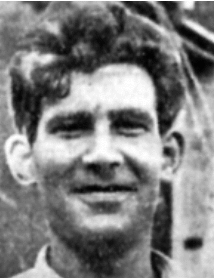 Chaim Nomis, the son of Moshe-Avraham and Fruma, was born in Berlin on 20th March 1920. He attended the Montefiore primary school which his mother helped to found. He continued his studies through high school completing his matriculation examinations in German and English.
Chaim Nomis, the son of Moshe-Avraham and Fruma, was born in Berlin on 20th March 1920. He attended the Montefiore primary school which his mother helped to found. He continued his studies through high school completing his matriculation examinations in German and English.
At the age of 11 he joined a Jewish scout movement, learning there that there was a Jewish national problem. When his group was absorbed into the Hashomer Hatzair movement, he became an instructor and leader of his own group at the age of 15. After that the Zionist principle became holy to him. Even at an early age he was a serious lad who thought deep thoughts.
In 1938 he succeeded in escaping from Germany to England with the aid of a student permit. But he did not continue his studies. He chose the path of a pioneer and worked in London as a driver. He expanded his activities in Hashomer Hatzair and was one of its founders in England. After a day’s work, he would travel out to the suburbs of East London, standing on platforms, hair wild and clothes disheveled, protesting against current concepts in England, arousing Jewish youth to Zionism and socialism. He knew he had to find a way into the hearts of the young people. He succeeded in making connections with the English youth and brought them into the movement, despite the difference in language and social and cultural backgrounds. Many of his followers made their way to Israel over the years.
His working conditions were harsh as Britain was engaged in a war of survival. He was considered a foreigner and interned for a year as an enemy alien.
On his release he established “The Nest” in London, and for quite some time did a variety of jobs in the movement – he was chief proofreader and participated in all activities – summer camps, seminars, and more. He was also considered an instructor, a distributor of information, one who was involved in all investigations, a publisher of commentaries, the planner of work programs and the one who suggested subjects for discussions, organized holidays and ran the newspaper. His many ideas and suggestions bore fruit. He was a deep thinker and could examine each problem analytically. He was close to politics, literature and art. He wrote poetry and left behind some rich and comprehensive writing. By nature he was a fighter and rebel. He continued to value the new and trashed the old. He believed in human beings and their future. He always assisted his fellow men and he created a warm and friendly atmosphere just by his presence. Humble and interested in everything, he did not see himself as someone special.
At the beginning of 1947, when illegal immigration began from England, he and his wife left with Aliyah Bet, in spite of the fact that he knew they would be sent to Cyprus.
The members of the movement parted from him with heavy hearts, but his image remained with them because of the legacy of programs and activities that he left behind.
In a clash with the British who intercepted the ship the “Theodore Herzl” on which he sailed, he was lightly wounded, but on the day following his arrival in Cyprus, he began immediately to organize the youth in the camp. Released after nine months of internment, he arrived in Israel in early 1948 and joined Kibbutz Ha’Ogen in Emek Hefer.
A few months later he was mobilized, and served in one of the battalions of the Alexandroni Brigade. The army immediately sent him to an NCO course before he had done any training as a recruit. His officer said, “I can depend on you, learn it all and you will return a far better soldier that many others.” The fact was that he stood out on the course: his personality and leadership were conspicuous. His superiors trusted him on missions. They saw in him someone who would be followed wherever he led his men. He carried out his duties with courage and loyalty.
Leaving for the southern front on 29th October 1948, he wrote a letter to his wife: “Life is not dearer than mortality itself. All I have accomplished in life, and could have accomplished in the future, could easily have been accomplished by another human being. With my death, nothing will be lost…….but my heart is heavy with grief for you. Indeed what is my victory in war to you if I am not here to substantiate it? The grief is so very tangible – sorrow for the joy and happiness we shared and will no longer have and sadness that I will not see our child again.”
On the night of 28th December, in the attack on Iraq-el-Manshiya he received an order to outflank and secure a road. Crawling at the head of his section in thick mud, his section eliminated the early look-outs with a hand grenade and overcame the first position, but being outnumbered by the Egyptians, before they had fired no more than five rounds from their rifles they received an order to withdraw. Chaim’s group covered “B” Company in the withdrawal, and while doing so, he was killed.
He was buried at Faluja. On 8th December 1949, he was re-interred in the Netanya cemetery. He was survived by his wife Tova and one child.
Source: Translated from the Yizkor website by Joe Woolf

